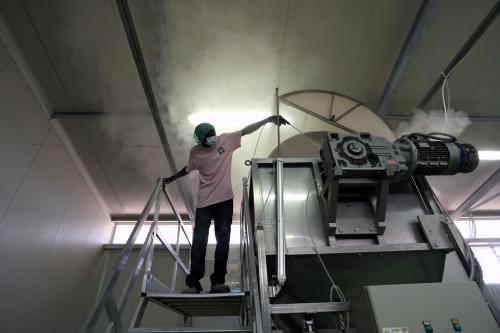Tunisia, like many African countries, is facing an influx of young people into its workforce, but the country doesn’t have enough jobs to absorb them. Recent research, though, reveals that there might actually be great potential and even a comparative advantage for job creation in Tunisia in “industries without smokestacks” (IWOSS). IWOSS are sectors that share much in common with manufacturing, especially their tradability and tendency to absorb large numbers of low-skilled workers. Examples of IWOSS include agro-industry, horticulture, tourism, and some information and communication technology (ICT)-based services.
Through an adequate management of these sectors, job creation and export development could allow the creation of new areas of comparative advantage and have a positive impact on other sectors as well. As Tunisia’s economic growth rate has lowered to 2 percent in the period from 2012 to 2019 (according to the Central Bank of Tunisia), we must consider new strategies and other policy improvements to reverse this trend and boost job creation in the country.
The challenges in this area are spread over several fronts. The Tunisian labor market suffers from a mismatch between labor demand and supply, as well as a strong imbalance linked to the gender gap. This phenomenon mainly concerns women, young people, and graduates (European Training Foundation, 2019). The latter are often excluded from the labor market due to a mismatch of skills required to enter the job market, despite their acquisition of qualifications and degrees.
Thus, our research proposes a way out of youth unemployment through an analysis of the Tunisian economy since the 1960s, including forecasts following the COVID-19 crisis, with the aim of providing an alternative perspective that looks beyond conventional “smokestacks” manufacturing and builds on strengths to find room for improvement in industrial policy, including nontraditional agriculture or services.
Why are IWOSS so important?
This study aims to show how the job creation, combined with the identification of the skills required to work in a given field, might have a concrete impact in decreasing youth unemployment. The impact of IWOSS on the Tunisian economy emerged as early as the 1980s, when the market shifted toward this new economic sector, which represented 44 percent of Tunisia’s GDP on average between 2015 and 2019.
Furthermore, through a comparative approach with other activities, we find that the growth in value added by activity sector indicates the relative importance of IWOSS sectors—especially the tourism sector, followed by the transport and financial sectors—to the Tunisian economy. Because of their particular potential for growth in the Tunisian context, we examined the specific IWOSS subsectors of tourism, financial services, and ICTs, and found that, generally, their contributions to the Tunisian economy result in a better capacity to resist and adapt to structural shocks.
Table 1. Growth in added values by activity sectors at prices of the previous year (annual change in %)
 Source: Table from Mouley, and Elbeshbishi, (2021). “Addressing youth unemployment through industries without smokestacks: A Tunisia case study.” The Brookings Institution.
Source: Table from Mouley, and Elbeshbishi, (2021). “Addressing youth unemployment through industries without smokestacks: A Tunisia case study.” The Brookings Institution.
Recommendations
The COVID-19 crisis had an undeniable impact on all sectors of the Tunisian economy—especially tourism—though agriculture, fisheries, and ICT suffered least. Given the widespread damage on top of the already high youth unemployment rate, a multistakeholder response is essential for creating jobs for young Tunisians. In order to unearth the employment generation capacity of IWOSS sectors, key constraints that inhibit the growth of these sectors have to be addressed. In short:
- Tourism. Tunisia still needs some crucial enablers like political stability, public-private partnerships, and the development of promotional campaigns that further enhance Tunisian culture, traditions, and national heritage to make the tourism industry even more prosperous. Building infrastructure, especially improving transport and communications for tourism, would also have a positive impact on other sectors such as agriculture and construction.
- Information and communications technology. For the purpose of enabling greater development of the ICT sector, policymakers should commit to enhancing social inclusion and making high-quality ICT training and education accessible. Such interventions could lead to the development of e-Administration and encourage investments in the ICT industry to create jobs. The “Digital Tunisia” and “Smart Tunisia” programs provide a clear strategy to this end.
- Financial services. Policymakers should aggressively encourage a transition to digital tools, promote digital payments, and support the development of further technological innovation.
In the end, we find that the ICT, financial services, and tourism sectors can be critical for addressing the country’s jobless growth challenges, if interventions like improved infrastructure, better access to long-term financing, and enhanced digitization, among others, can be implemented.
The Brookings Institution is committed to quality, independence, and impact.
We are supported by a diverse array of funders. In line with our values and policies, each Brookings publication represents the sole views of its author(s).








Commentary
Industries without smokestacks in Tunisia: Creating jobs in tourism and ICT
September 29, 2021